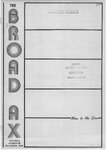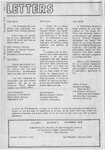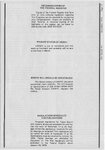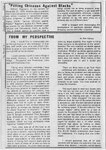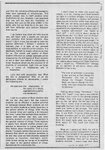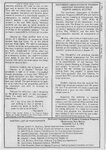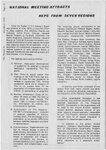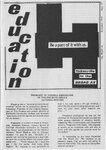| OCR Text |
Show 1] Page NATIONAL MEETING FROM SEVEN REGIONS December 1975 REPS ATTRACTS After the Region II Trio Advisory Board was selected in June, 1975, a concerted effort to draw together Trio Advisory Boards was initiated. James Pruitt, Bound Program at David Rosenthal, Associate Director, Fordham Upward University Director, and Upward Bound at Fairleigh Dickinson University, con- The Broad Ax tacted chairpersons of other regions and urged that plans be drawn for ari assembly. After a discussion of operational procedures and the various concerns of each advisory board, a National Conference was deemed apropos and held October 1-3 in Chicago. The Agenda items were as follows: 1) National Association—Development of guidelines to establish a national association representing Trio Programs. 2) Task Force—\|t would appear that findings of the Task Force may provide the basis for new legislation to replace or supplement Trio. Among unresolved issues are a) integrity of Trio in its present form, b) the assumption of program costs by insti- tutions, c) sponsorship of programs. 3) Buckley Amendment—Gives all stu- dents 18 years or older the right to have access to their records. The issues: right to privacy; confidentiality; information to parents: and information to agencies. 4) Authorization for Trio to be served; differences following people participated in the Chicago Conference: Michael Bagley, SUNY; Edward Banfield, Central College; Larry Barclay, College Entrance Board; Marilyn Elward, Community Development Administration; Earl Farrow, Rutgers State University; Bernard Fein, Livingston College; Santia Garcia, Aspira of New York; Aaron Godrey, Review Editor: Carlos Gonzalez, Central YMCA Community College; Vernon Haley, Bronx Community College; Delores Hunter, Rochester Institute of Technology; Sam Johnson NSSFNS; Arnold Mitchum, President MAEOPP; Ida Moose, Arkansas Plan Inc.; Cy Pernell, Talent Search Project; James Pruitt, Fordham University; David Rosenthal, Fair- leigh Dickinson University; Boston College; Earl Thomas, Princeton versity; Harla Tumbleson, Coe _ College; Ulysses Shelton, Edward Waters, Marist College; fall, Virginia Commonwealth Robert Young, Uni- Earl WheatUniversity; Williams, Broad Ax Editor; Hugh Essex College; Willie Zanders, Loyola University. A steering committee composed of one person from each region present was established to coordinate activities preliminary to the formation of the National Association. After considerable discussion it was decided the new coalition would be called the National Association of Trio Personnel (NATP). Membership in the organization will be Programs— HR-3471—Considerations: inclusion of veterans regardless of income; funding levels, and percentage of the population The open to any project director, assistant project director, associate director of any other persons programmatically responsible for any Trio Program. Associate membership will be open to all people interested in programs for disadvantaged students. between enabling legislation and level of appropriation. 5) Communication—Regionalization has had an unequal impact in terms of disseminating information in the following areas: a)national and regional trends in education and program- matic philosophy and practice, b) changes legislation and regulations, c) innovation and ‘programmatic problems. In response to this action, Mitchum, President, Mid-American Arnold Associa- tion Program of Personnel, Educational Opportunity in the Mid-America Report, states, “We are nonetheless wary of the premature formation of a national group for we remain cognizant of the necessity of making any such group responsive to a grassroots constituency.”’ |
